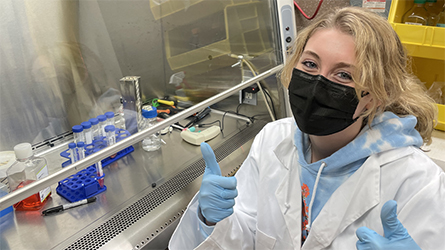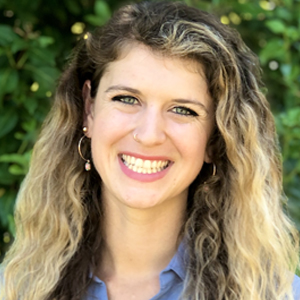Chapter member aims for the moon, lands on astrobiology
Hailey Kerns had little formal exposure to the sciences prior to beginning her undergraduate studies at Saint Leo University, but, she said, “It’s always been science for me. I made my parents get me all the books and encyclopedias on animals.”

an ASBMB Student Chapter member, and recipient of a 2021 ASBMB Undergraduate
Research Award. She would like to become an astrobiologist.
She maintained a love of nature and science throughout her childhood, she said; she and her dad “would always talk about life beyond … our planet.”
These conversations led to her interest in astrobiology. Now a senior majoring in biomedical sciences and a member of the American Society for Biochemistry and Molecular Biology Student Chapter at Saint Leo and president of their TriBeta Biological Honor Society, Kerns has applied for the University of Florida’s microbiology and cell sciences Ph.D. program. Her ultimate goal is to study astrobiology and work with NASA or another space company on the search for extraterrestrial life.
Since identifying her interests early on, Kerns has been consistent in her commitment to astrobiology. In high school she started looking at NASA’s career path suggestions page and has used it as a guide throughout her undergraduate career, which includes numerous research experiences, publications, presentations, awards and community engagement initiatives.
As a first-year undergrad, Kerns reached out to Jamie Foster, a professor in the Space Life Science Lab at the University of Florida, and has stayed in contact. This networking led to an internship at UF funded through the Florida Space Grant Consortium. Working with microbiologist Kelly Rice, Kerns studied the effects of simulated microgravity on the physiology of the bacterium Streptococcus mutans, which causes tooth decay.
Kerns’ favorite research experience has been taking part in the SEA-PHAGES program headed by Iain Duffy at Saint Leo. She joined the program in her first year and since has contributed to the discovery and isolation of more than 23 bacteriophages and the publication of their complete annotated genomes in GenBank. This was her introduction to research.
“Being able to see a visual effect from something so tiny, realizing there’s so much we don’t see or understand yet and so much for us to learn, that’s what excited me.”
Hailey received an ASBMB Undergraduate Research Award to work with biomedical researcher Sergiy Borysov at Saint Leo in summer 2021. Her lab mates were scheduled to present this research on “Cytotoxic Effect of Synthetic Peptides on Normal and Cancerous Cells” at the recent 2022 ASBMB annual meeting in Philadelphia.
From parents to teachers, professors and coworkers, a long list of people make up Kerns’ support network. “I send my gratitude to every person I’ve come across in my academic career,” she said, “as each of them has contributed to shaping me into the person and scientist I am today.”
Enjoy reading ASBMB Today?
Become a member to receive the print edition four times a year and the digital edition monthly.
Learn moreGet the latest from ASBMB Today
Enter your email address, and we’ll send you a weekly email with recent articles, interviews and more.
Latest in People
People highlights or most popular articles

Simcox wins SACNAS mentorship award
She was recognized for her sustained excellence in mentorship and was honored at SACNAS’ 2025 National Conference.

From humble beginnings to unlocking lysosomal secrets
Monther Abu–Remaileh will receive the ASBMB’s 2026 Walter A. Shaw Young Investigator Award in Lipid Research at the ASBMB Annual Meeting, March 7-10 in Washington, D.C.

Chemistry meets biology to thwart parasites
Margaret Phillips will receive the Alice and C. C. Wang Award in Molecular Parasitology at the ASBMB Annual Meeting, March 7-10 in Washington, D.C.

ASBMB announces 2026 JBC/Tabor awardees
The seven awardees are first authors of outstanding papers published in 2025 in the Journal of Biological Chemistry.

Decoding how bacteria flip host’s molecular switches
Kim Orth will receive the Earl and Thressa Stadtman Distinguished Scientists Award at the ASBMB Annual Meeting, March 7–10, just outside of Washington, D.C.

Thiam elected to EMBO
He was recognized during the EMBO Members’ Meeting in Heidelberg, Germany, in October.

